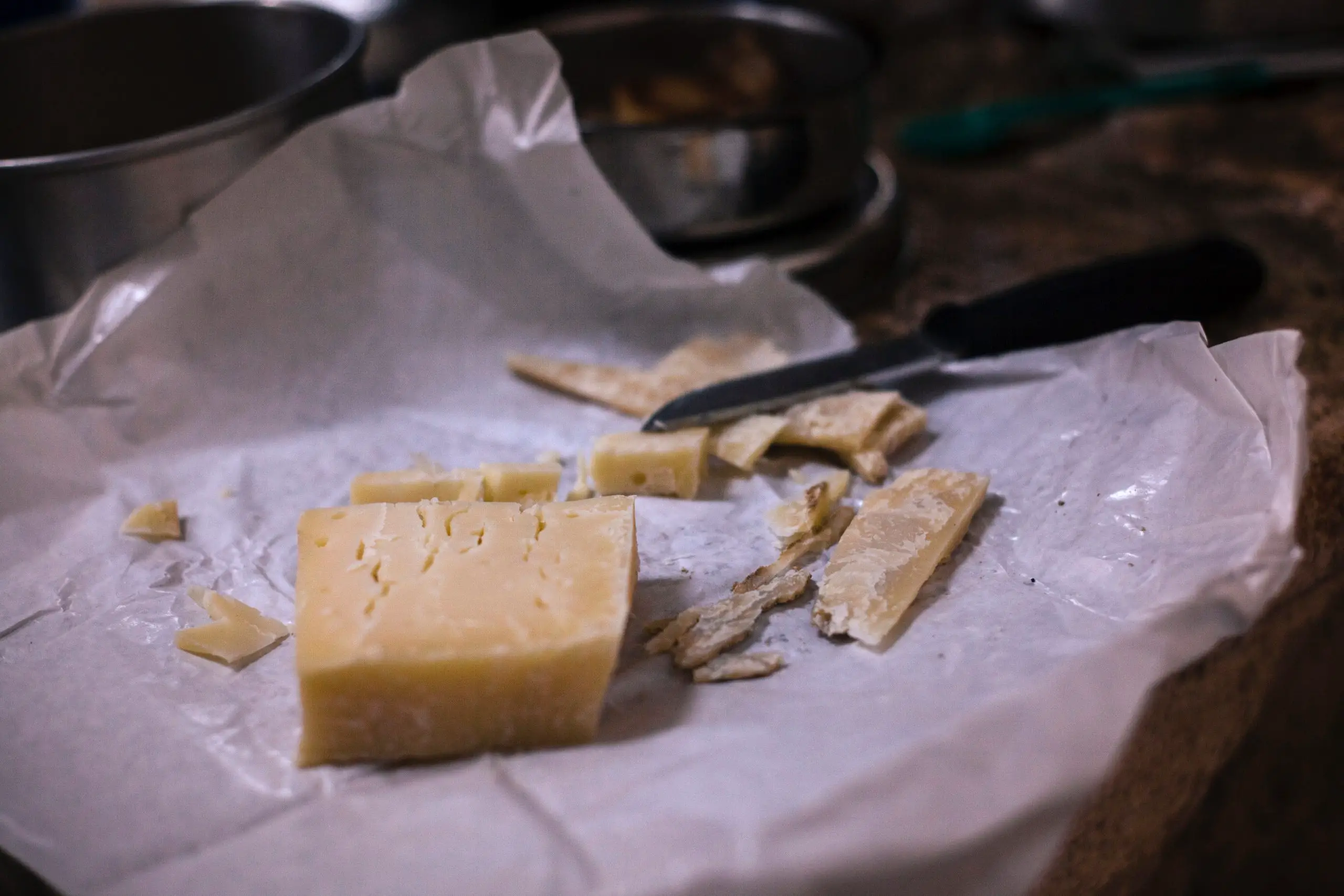Whether you want to purchase cheese for a party or stock up for the winter months, you are likely wondering how long cheese lasts in the fridge. While some general guidelines can help, the actual time that cheese is fresh depends on the type of cheese you are looking for and the environment in which it is stored.
Most soft cheeses can be kept in the refrigerator for at least seven days after opening, while most hard cheeses can be kept for three to four weeks. Toss soft cheeses and crumbled, shredded, or sliced cheeses (whether hard or soft) if you see mold, but carefully check hard cheeses for mold and cut off any spots.

How Long does Cheese Last in the Fridge?
Have a few different types of cheese in the fridge but are unsure which ones you should consume right away and which you don’t? How long is cheese good for?
It’s simple to become perplexed, given the wide range of cheese types and varieties available. This guide fills that need.
We separated it into two parts to make it easier to use.
The first covers general shelf life guidelines for all the major cheese categories—hard, semi-hard to semi-soft, and soft cheeses. Start there if you want a quick primer on handling any cheese you can get your hands on.
The second section is for you if, on the other hand, you’re interested in learning more about a particular kind of cheese (like Parmesan or Brie). I go into greater detail about the most available cheese types in it.
Cheddar
Keeping cheddar cheese fresh is a top priority. This cheese is versatile and can be used in everything from mac and cheese to apple pie crust. The best way to keep it fresh is to store it in your fridge or freezer.
Several factors determine how long cheddar cheese lasts. The water and protein content in cheese can determine its shelf life. It is also important to take proper precautions when storing cheese to avoid bacterial growth and food poisoning.
A simple two-hour exposure window to room temperature will be more than enough for most cheeses. However, the longer you keep cheese out of the fridge, the shorter its shelf life will be.
The best way to store cheddar cheese is in a cool refrigerator. A cooler refrigerator will help maintain its freshness longer. This is particularly important if you are storing a large quantity.
Blue Cheese
Keeping blue cheese in the fridge will keep the quality of the cheese for a longer period. However, if you are not careful, the cheese can rot. Having a small piece of spoiled blue cheese will not hurt you.
To keep blue cheese fresher longer, store it in a cool, dry place away from sunlight. A paper towel or two on the bottom of the cheese will help to absorb moisture.
If the cheese is wrapped in an airtight container, it should last a couple of weeks. To keep the cheese fresher, store it in a refrigerator with a temperature of 8 to 13 degrees Celsius.
Another way to keep blue cheese fresh is to place it in a cheese cave at room temperature. You can do this by wrapping the cheese in a piece of parchment paper or wax paper. This will keep it from drying out and absorbing flavor.
Soft-Ripened Cheeses
Depending on the type of cheese you buy, soft-ripened cheeses can last up to seven days in the refrigerator. However, this is a relatively short period compared to the longer shelf life of hard cheeses. Some soft-ripened cheeses can last for as long as a month.
When buying cheese, check the label for a specific time frame. Some popular cheeses, such as Edam, Gouda, and American cheese, have expiration dates. If you want to enjoy your cheese, you should buy it only when you need it.
The best way to store soft-ripened cheese is to keep it in a cool, dry environment. This is important because cheeses release a lot of water while ripening. The moisture will slow down the ripening process and help extract more whey.
To maintain the moisture in soft-ripened cheeses, you should wrap them in wax paper or plastic. You can also use cheese paper or parchment.
Shredded Cheese
Whether you’ve bought a block of shredded cheese or are planning to buy a pre-shredded package, there are a few things to remember about how to store it. Whether in the refrigerator, freezer, or pantry, it’s important to store it correctly. You could end up with spoiled, moldy, or sour cheese if you don’t. And spoiled cheese can lead to food poisoning, diarrhea, and even death.
You can easily store shredded cheese in your refrigerator. Ensure it’s in an airtight container with a lid lined with wax or parchment paper. This will prevent moisture from accumulating and mold from growing.
If you want to store your shredded cheese in the freezer, use heavy-duty freezer bags. They’ll prevent freezer burn. You can also transfer your shredded cheese to a zip-lock bag. However, it may lose some of its flavors.
Shredded cheese can last for up to eight months in the freezer. However, if it’s not frozen, it’s best to keep it in the fridge.
How Long does a Block of Cheese Last Once Open?
Block cheese’s shelf life is influenced by several variables, including its type and storage method. Block cheeses like cheddar that contain mold spores tend to dry out more quickly than those that do not (like mozzarella). Goat and soft ricotta cheeses should be eaten within five to seven days following opening.
How Long does Asiago Cheese Last?
Italian cheese, known as Asiago, is creamy and nutty. It is frequently grated on top of pasta dishes and soups made in Italy. The shelf life of asiago cheese can last for years when kept in proper storage. An opened piece of Asiago cheese can stay in the fridge for 4 to 6 weeks.
How Long does Cheddar Cheese Last in the Fridge?
A piece of opened cheddar cheese can last 3 to 4 weeks in the fridge. Cheddar cheese spoilage bacteria grow very slowly when kept in a refrigerator. Cheddar cheese that has passed its expiration date can be kept unopened in the freezer for about four months.
How Long does American Cheese Last in the Fridge?
If left unopened, American cheese has a very long shelf life. Unopened blocks of American cheese typically keep for two to four months in the pantry and even longer in the refrigerator. If the cheese is kept tightly wrapped after you open the package, you can store it in the refrigerator for up to 6 weeks.
How Long does Cheese Last in the Fridge Unopened?
An unopened package can remain in the refrigerator for two to four months if properly stored. However, a block of cheddar or a container of Parmesan that has been opened in the refrigerator will last about six weeks.
Soft cheeses like Brie or Mexican blends won’t last as long as hard cheeses like cheddar or Swiss.
How Long does Cheese Last in the Fridge When the Power Goes Out?
If you reside in a region where power outages occur frequently, you should be aware of how to keep your cheese secure when this occurs. Depending on the type of cheese, it can keep without refrigeration for anywhere between two and four hours. Soft cheeses like cream cheese and cottage cheese have a shorter shelf life than hard cheeses like cheddar and Swiss.
Reference: Food waste and domestic refrigeration: a visceral and material approach
How can you Tell if Cheese is Spoiled?
There are many warnings about cheese spoilage. The secret is to be on the lookout and thoroughly examine every aspect, whether it be taste, smell, or appearance.
Checking the product’s best-before date is the first step, though. Get rid of it immediately if it is damaged and well past its sell-by date.
Let the examination determine the outcome if the date is reasonably close. Keep in mind that if cheese is not properly stored, it could go bad months before it should.
Appearance
The easiest way to determine if your cheese has expired is to notice changes in its appearance. Think about the color first. On the surface, look for indications of discoloration or dark areas.
For instance, fresh cream cheese is always a uniformly white color. A warning sign is when the white starts to turn yellow or develops green streaks.
You should also check for mold growth on the surface at this time. After cutting a piece out of the cheese can still be used if the mold has not gotten too far inside. Later in the article, we go into more detail about this.
Smell
Fortunately for consumers, all dairy products release a foul odor after spoiling. However, it becomes difficult to examine the smell. The majority of cheeses have a distinct aroma all their own.
Is this cheese renowned for its aromatic qualities? This makes it challenging to distinguish the smell. Is the cheese starting to go bad?
Therefore, knowing how your cheese smells when you first open the packaging is important. Then, you’ll be able to compare aroma changes to the smell of fresh cheese and spot decompositional indicators.
No matter how strong a cheese may smell, keep in mind that it only becomes rancid when it begins to rot.
Conclusion
The knowledge that cheese deserves care is what we want you to take with you. It’s not enough to throw it in the fridge.
You must become knowledgeable about its shelf life, spoilage indicators, materials to avoid, and proper storage techniques. We sincerely hope that the information above was useful to you.
Are there any other cheese-related worries you might have before you leave? Are you debating whether to buy or make your grated cheese? In making your decisions, we can offer some assistance.
